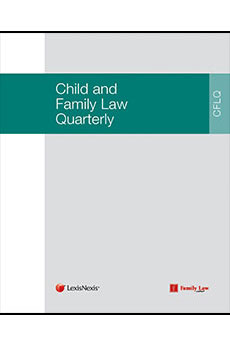- News & Comment
-
Online Shop
Online Services
Looseleafs
Law Reports
Books and eBooks
- CPD & Events
- Authors
- About Family Law
- Contact


Cafcass and Women's Aid have collaborated on a report which builds a picture of what happens in court in cases where domestic abuse features.
The research finds that 62% of applications to the family court about where a child should live or spend time feature allegations of domestic abuse. It also highlights the significant impact on children who experience domestic abuse and the complexity of cases in which allegations of domestic abuse occur.
The full report can be found here.

Anthony Douglas CBE, chief executive of Cafcass said:
‘This research highlights the complexity for the courts faced with making a safe decision for children against a backdrop of disputed allegations and multiple safeguarding concerns.
We have looked into those cases where unsupervised contact was ordered, as a further assurance to our work carried out during proceedings: we were satisfied that in each case action had been taken to manage risk relating to domestic abuse.
In collaborating with Women’s Aid we hope others in the sector will follow, to take a joined-up approach to improving the services for victims of domestic abuse.’
Katie Ghose, chief executive officer of Women’s Aid said:
‘Women and children who have made the courageous step to leave an abusive relationship must be made safer by the family courts, not be put in more danger. Our report, Nineteen Child Homicides, captured the stories of nineteen children, all intentionally killed by a parent who was also a known perpetrator of domestic abuse. These killings were made possible through unsafe child contact arrangements, formal and informal; and most worryingly, over half of these arrangements were ordered through the courts.
The research carried out with Cafcass helps build a picture of what is needed to ensure the future safety of women and children survivors of domestic abuse. We will continue to highlight the importance of judicial understanding of domestic abuse and coercive control which often continues long after a relationship has ended, and where the family courts are often a vehicle to perpetuate this abuse. Women's Aid is committed to working alongside Cafcass and the family judiciary to ensure all relevant professionals have the training and skills to keep children safe.’



